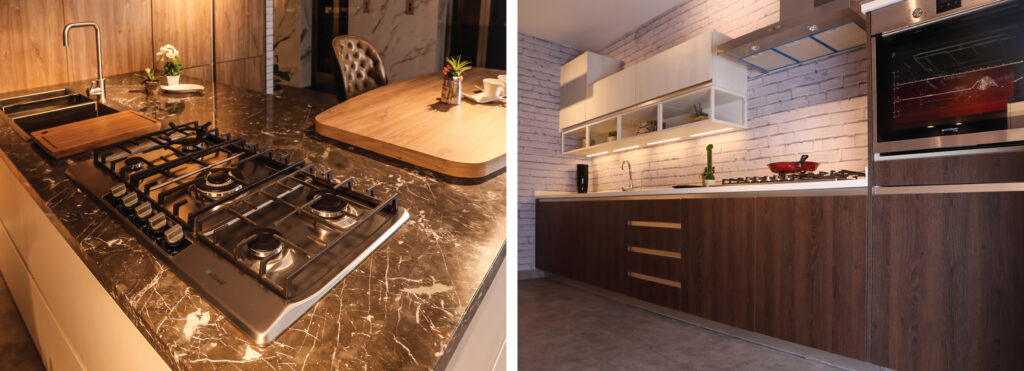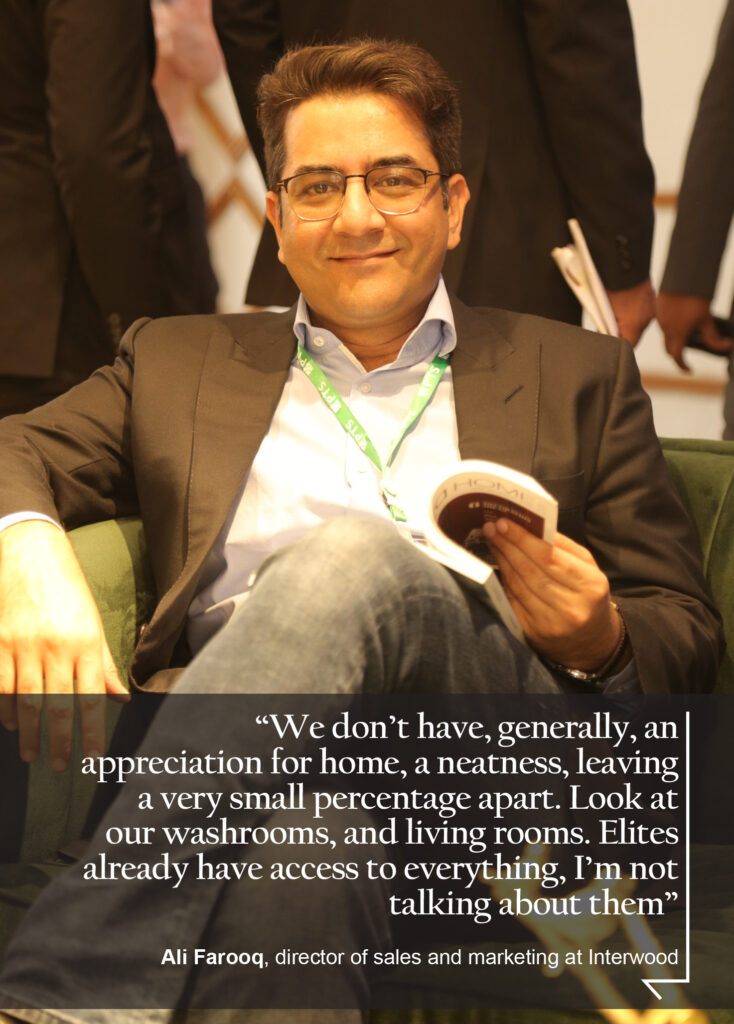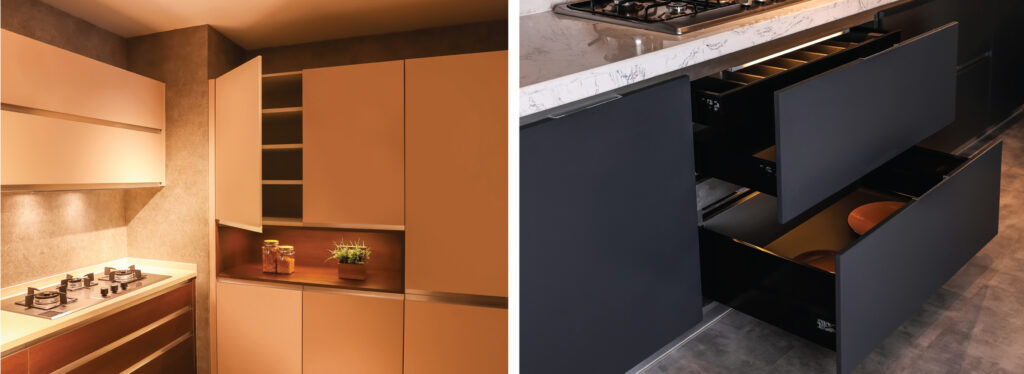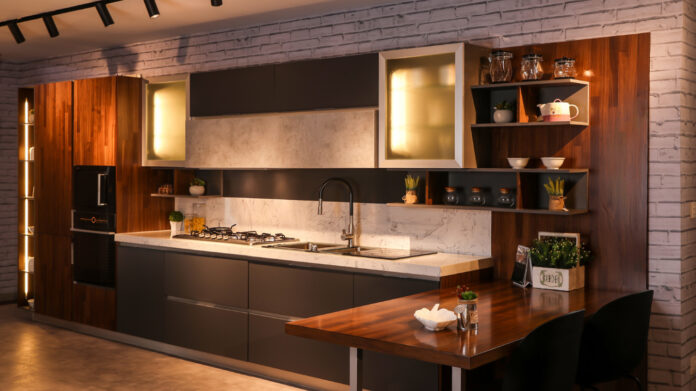In Karachi, the exterior of a building can often have absolutely no correlation with the interior of the building. Several shabby, dusty, brownish structures with dilapidated roads outside, will boast perfectly upscale, 21st century interiors. Bukhari Commercial is no exception. Situated smack in the middle of Karachi’s upscale Defense Housing Authority (DHA) neighbourhood, the commercial area has potholes and sand heaps, and yet somehow is home to the city’s most expensive eateries and nicest showrooms.
But saying Interwood’s showroom is just ‘nice’, would be a bit of an understatement. The home furnishing showroom is tucked away in Bukhari Commercial, and is unassuming from the outside. But when one walks inside, it is apparent that some serious money has been spent on this showroom. And why wouldn’t it be? The five-floor showroom is one of just eight showrooms the company has in Pakistan. The showroom depicts immaculate kitchen tops, streamlined office furniture and dream home interiors.
We bring this up not to lavish praise on Interwood, but to reveal that this is actually the fundamental dilemma with Interwood. To a layperson, its slickness and design aesthetic suggest a clientele in a high income bracket. But as Ali Farooq, director of sales and marketing, and his entire sales team point out, Interwood is adamant on making sure that it reaches a larger audience. The brand’s guiding principles are ‘convenience, quality, affordability’. The brand thinks it has got the first two down; it’s about trying to hammer home the third point.
It turns out, Interwood’s personal efforts to make its products more affordable, such as through financing schemes, speaks to a larger trend of an untapped market of Pakistanis waking up to the fact that perhaps it is time to start living in nicer-looking homes.
A look at Interwood
First, let us take a look at the company itself. Interwood was started as a family business in 1974, by Malik Farooq, the family patriarch, who had no prior experience in the industry. Yet, the company did well, focusing on high-quality cabinets, which earned him contracts with several companies.
Starting out as a small workshop in Karachi, Farooq set up the company’s first manufacturing facility in Garhi Shahu, Lahore. However, in 1987, that factory burnt down. According to Omar Farooq, his son and the current CEO of the company, it was the solid relationship between Interwood and its suppliers that helped the company back on its feet. Malik Farooq stayed the head of the company until 1995, keeping it a mostly close-knit, relationship-based contractual company.

It was around the turn of the century that the children joined the company: eldest son Omar Farooq joined in 1995, his younger brother Ali Farooq joined in 1997, while their sister Madiha Jalal joined in 2001. In 2002, the children decided that the company had become stagnant. So, in 2002, Interwood began to branch out into retail, opening up stores and developing specialized products.
It was a bet that paid off. Today, the company still does contractual work, but it accounts for only around 40% to 45% of total sales. The rest of sales come from retail. That is further divided into five categories: home, office, kitchens, doors, and wardrobes. Within retail, home accounts for 40% of sales, office another 40%, and kitchens, doors, and wardrobes make up the remaining 20%.
This, according to Ali Farooq [subsequent mentions of ‘Farooq’ refer to Ali, and not Omar], is a massive improvement. “When we talk about home, which is our fastest growing category, five years ago we were nothing in this category,” he says. According to him, the home furnishing market worldwide is 95% home, and only 5% office, yet Interwood was focused primarily on the office. The company decided to flip that, and start focusing on the home.
In the last four years, the company has done well: its sales have increased steadily from Rs2.9 billion in 2016, to Rs3.6 billion in 2019, at an average growth rate of 7.5% per year. Revenue also increased from Rs2.5 billion in 2016 to Rs3.1 billion in 2019, at an average annual growth rate of 7.4%. The company’s profit stood at Rs116 million in 2016, dipped to Rs90 million in 2018, before climbing to Rs346 million in 2019, growing by an astonishing average of 43.9% per year.

Today, the company has a 600,000 square foot manufacturing facility that features five different factories, and has hired around 1,800 people.
The company has not altogether abandoned expanding and improving its contractual work. In the last five years, they have won major projects, such as the renovation of airports in Islamabad, Faisalabad, Multan, Peshawar, Quetta and Mai Bakhtawar Airport in Thar. The company also built the private wing in Aga Khan University Hospital in Karachi, and have also helped design certain government schools across the country.
The three children each have played to their strengths, and play a key role in the company. Madiha, an NCA graduate, is the design director, and has shaped the brand’s aesthetic. The talkative and gregarious Omar Farooq is the CEO and manages the finance department, and supply chain. He is the most visible face, and can be credited with turning Interwood into a more recognizable name in the home furnishing space. But it is the methodical and somewhat introverted Ali Farooq who, according to sources, is the brains behind strategy. Along with sales and marketing, he is the head of business growth expansion and corporate network. In conversation, he is judicious about information he imparts, but has clearly spent a lot of time thinking about his consumer. What does the Pakistani consumer want to buy, and how do they think?
The Pakistani consumer
There are two fundamental flaws with the home furnishing market: one is of cost, and the other is of design sense. To combat both, companies like Interwood have to spend a substantial amount of time educating their customers. “We are continuously trying to change [our marketing]. It has been a roller coaster, frankly.” says Farooq.
Let us look at the first problem. Companies like Interwood’s main competitor is not another home furnishing company, but the mohalla carpenter. Typically, in a Pakistan home, it is a carpenter who is called in to fix doors, make shelves and even design items. The problem is that this entire model makes no sense cost wise, at least according to Farooq. The carpenter is given a task, such as making a door, but the customer has no idea what the end product is going to look like. That vision is in the carpenter’s head. Neither does the customer have control over the costs, or even the timeline of when the carpenter will finally make his door. The carpenter has costs that keep adding up: the hinges, the polish of the door. At the end of the task, the customer is handed a bill that neither the carpenter or the customer seem to have predicted or have control over.

“You don’t know what your costs are, and you end up trying to understand where all your money is going. So that’s something I feel needs to change.” Farooq says. “So we changed that whole thing. We started making pre fitted doors, closets, kitchens… we have also been making customizable items. We try to shift the consumer’s buying pattern from the carpenter”.
Farooq compares the shift in the market to the similar shift seen in women’s salwar kameez clothing in the last two decades. “Your mother would probably be buying a lot of unstitched stuff, now she, or maybe you, are buying a lot more stitched stuff. And the darzi is becoming… I would say, obsolete in my lifespan. The carpenter, in this case, is the darzi Interwood is trying to reduce people’s dependence on.
The second problem is one more of design sense. Essentially companies like Interwood have to make a case for why you would want to spend money on nicer things inside your home.
According to Farooq, typically, ten years ago Pakistanis would buy or rent a home. But the next item on their to do list was not the interior of the home. It would be a car, and after that it is nice clothes that we wear ie: all items that have to do ‘jo baahir dikhta hai’, or a focus on the exterior.
“We don’t have, generally, an appreciation for home, a neatness, leaving a very small percentage apart. Look at our washrooms, and living rooms. Elites already have access to everything, I’m not talking about them.” says Farooq.
It is an approach that Interwood wants to change. In the kitchen showroom, the salesperson does a pitch that sums up the company’s attitude. “A typical housewife spends hours in the kitchen, and yet we don’t think about a kitchen. What is the height of the countertops? What color should it be? Why should I have drawers shut with a bang or hit my knee?” the sales team explained.
Basically: if you are going to spend a lot of time in one place, you want it to look nice, so that you feel good about spending time there. This ‘feeling’ is what Interwood, or home furnishing companies, are trying to capture. And according to Farooq, people’s buying patterns have changed in the last five to ten years alone. Pakistanis are now willing to pay for that ‘home feeling’.
Challenges
Still, there are a lot of problems that come with working in this industry. For Interwood, your main competitor is the carpenter, it is actually very hard to have a grasp of the size of the industry you are even competing with. According to the company, the home furniture market in Pakistan is around $3 billion, but they could not be actually sure. One of the problems is that the Federal Board of Revenue does not collect taxes from several unregistered carpenters and shops across the country.

“The tax structure is very competitive. If I sell a door, I have to pay a 17% tax. Unless the government probably has a strategy this industry will never be able to [survive]. So in the face of it, we look expensive.” says Farooq.
Interwood does not seem to count other home goods brands, like Habitt, or office decor like Molecule Pakistan as competition, mainly because they said no one else has a blend of contracts, office and home like they did. Instead, the competition is always the carpenter, or unregistered work. This has led to a difficulty in creating a market. “This is a very product driven market. We have to establish the product, but there’s no benchmark for it. You know the benchmark for cars. Audi and Mercedes are benchmarking against each other, right? We have to do the bench mark, the price determination ourselves.”
Expanding the market: financing home renovations
But by far the biggest challenge has been to figure out how to sell its home products. Let us look at kitchens.
One one end, in the same upscale Bukhari Commercial, is the foreign Z’Mario kitchen brand, which sells Italian kitchens of upwards of Rs4 million (40 lacs), to the Pakistani economic elite. Then there is Prestige, a brand that sells both Italian and domestic kitchens; the domestic kitchens can cost around Rs500,000 to Rs600,000. Meanwhile kitchens in Nursery’s furniture market, another locality in Karachi, start at around Rs60,000.
An Interwood kitchen is trying to hit that sweet spot of kitchens of around Rs175,000 to Rs350,000. The concept of a ‘foreign kitchen’ is still very much alive as a selling point: Interwood says its kitchens are designed by ‘renowned Italian designer Alfredo Zengiaro’, and the kitchens have exotic names like Vogue, Bianca and Moreno. The target audience are people who earn between Rs100,000 to Rs200,000 per month, and who cannot afford the Rs50,000 upfront deposit for items like a nice kitchen, unless they have savings or a gift from family members.
So, how do you get this target demographic to spend? On a business trip to Peshawar around five years ago, Farooq was surprised by one of the dealers he met, who was running his own mini hire-purchase program of double-load fridges. Not a bad idea!
So, in the last five years, the company partnered with Standard Chartered Bank, United Bank (UBL), Habib Bank (HBL), Faysal Bank and Silkbank for an installment program through which customers can buy kitchens. The program can go up to 24-month, depending on the customer. Banks are offering 0% interest financing for the first six months, though there may be additional charges such as processing fees.
The only problem: the installment scheme is available to people who have credit cards at those banks, and the customer is limited to the financing limit on the credit card.
“A credit card user is a very small percentage, only 10 lac [1 million] people, and debit cards are maybe 40 lac [4 million] people of the entire banking industry,” explains Farooq. The company also noted that customers in Pakistan are often hesitant to use credit cards because of a fear of risk, fraud and interest associated with credit cards.

This led to idea number two: a financed payment plan, which is open to customers with cards from any bank, or even people who just want to deal in cash (after all, most things in Pakistan run on cash). Under this scheme, which is still in the trial stage, customers can choose a kitchen, set up a three-month, six-month, or 12-month installment program. In the first three months, or when 50% of the product has been paid for, the kitchen is delivered to the customer. Kitchens can start from Rs 29,200 a month. To promote this scheme, Interwood is currently offering 0% interest financing for customers who take up the installment plan. The plan also works for wardrobes, starting from Rs 13,140 a month, and doors, starting from Rs 5,160 a month.
Third, Interwood has partnered with Meezan Bank, on a ‘consumer ease product’ (the partnership is just about to be finalised). Meezan Bank already had an existing Islamic installments product fridges, TVs and items typically bought by families for their children when they are married, which will now also feature furniture and kitchens from Interwood.
“I think its a beautiful product, it’s Islamic, its insured for a year, we’re very happy it’s Meezan…because its Islamic Sharia [based] there’s a lot of due diligence, it took them six months.” says Farooq.
Will these schemes work? Farooq and his team think it will. As a member of his sales team put it, “We should have nice things…banda ko maza ana chahiye kitchen mein kharay ho kar.” That too, a kitchen you can now afford.


























A great intiative has been taken by Interwood for middle class people even they can have their dream kitchens now. And Yes if you get your kitchen design from Interwood in the mention above amount tab to bnday ko kitchen main khara ho kay Maza aye gha he !!
Furniture Shops in Islamabad: Home furniture plays a vital part in providing balance in a house. Comfortability is the most important consideration while selecting the furniture article. Meanwhile quality, design, and range also impact a lot. Gourmet Homes and Furnishers provide you all these qualities under one roof. A high-quality furniture collection by Gourmet Homes and Furnishers is available in the Islamabad furniture market. You can access the beautiful and luxury furniture online which is available and just a few clicks away from you.
A great article with facts and information
very informative blog by interwood about the different furniture trends in pakistan
A great step has been taken by gurmet furinishers for in All Over Pakistan.